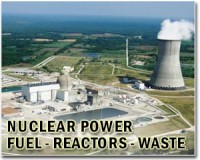 |
Washington (AFP) March 12, 2011 A US nuclear expert said Saturday that the accident at a Japanese nuclear reactor was one of the three worst in history, and could become a "complete disaster" if it goes to a full meltdown. "This is going to go down in history as one of the three greatest nuclear incidents if it stops now," Joseph Cirincione, the head of the Ploughshares Fund, said in an interview on CNN. "If it continues, if they don't get control of this and ... we go from a partial meltdown of the core to a full meltdown, this will be a complete disaster," he said. A devastating 8.9 magnitude quake that struck Japan on Friday set off the emergency at the Fukushima No. 1 atomic plant, which was then hit by an explosion Saturday that prompted an evacuation of the surrounding area. Cirincione faulted Japanese authorities for providing partial and conflicting information about what was happening at the plant, located some 250 kilometers (160 miles) northeast of Tokyo. "The big unanswered question here is whether there's structural damage to this facility now. We saw the explosion early this morning. Are there other structural damages that may make a meltdown all but inevitable? We don't have any information from the power company on that. That's what we need." Cirincione said the presence of radioactive cesium in the atmosphere after the plant was vented indicated that a partial meltdown was underway. "That told the operators that the fuel rods had been exposed, that the water level had dropped below the fuel rods and the fuel rods were starting to burn, releasing cesium," he said. "That's when people really started paying attention to this crisis," he said. The two worst nuclear accidents on record are the 1986 Chernobyl disaster in Ukraine and the partial core meltdown of the Three Mile Island reactor in Pennsylvania in 1979. Japan's nuclear safety agency rated the Fukushima accident at four on the International Nuclear Event Scale from 0 to 7, meaning an accident "with local consequences," an official said Sunday. The Three Mile Island accident in the United States was rated five while the Chernobyl disaster was a seven.
Share This Article With Planet Earth
Related Links Nuclear Power News - Nuclear Science, Nuclear Technology Powering The World in the 21st Century at Energy-Daily.com
 High radiation in Japan nuclear plant, 'no health hazard'
High radiation in Japan nuclear plant, 'no health hazard'Tokyo (AFP) March 12, 2011 A Japanese nuclear safety panel said Saturday radiation levels were 1,000 times above normal in a reactor control room after a huge quake damaged a plant's cooling system, Kyodo News said. Public broadcaster NHK, quoting nuclear safety officials, said there was "no immediate health hazard" to nearby residents from a possible minute leakage, and people were urged to evacuate the area calmly. ... read more |
|
| The content herein, unless otherwise known to be public domain, are Copyright 1995-2010 - SpaceDaily. AFP and UPI Wire Stories are copyright Agence France-Presse and United Press International. ESA Portal Reports are copyright European Space Agency. All NASA sourced material is public domain. Additional copyrights may apply in whole or part to other bona fide parties. Advertising does not imply endorsement,agreement or approval of any opinions, statements or information provided by SpaceDaily on any Web page published or hosted by SpaceDaily. Privacy Statement |